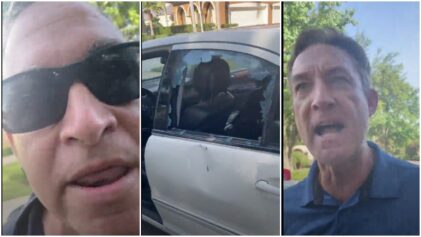After Rachel Jeantel left the witness stand following another six hours of grueling cross-examination by George Zimmerman’s lawyers, she immediately prompted a national debate about the language and attitudes of black youth culture and whether her testimony had helped or hurt the defendant.
Jeantel was billed as the prosecution’s star witness because she was the last person to talk on the phone to Trayvon Martin right before he was killed by a gunshot from Zimmerman. Her testimony is crucial because she reported that Zimmerman aggressively followed 17-year-old through the subdivision until he had no choice but to confront Zimmerman.
But that key fact in her testimony has been somewhat lost in the raucous debate about the language used by the 19-year-old Jeantel, her disrespectful attitude toward the defense, her inarticulateness and seeming lack of intelligence.
It is a fascinating instance of black youth culture, with its language and attitudes, splashed across a national stage as it collides with the protocol of the criminal justice system.
The key question will be how the jury— five white women and one Latina—views Jeantel’s believability after her two days of testimony. Will they be influenced by her language and attitude to view her as not very likable, and then make the jump that she is not to be trusted and believed?
Will they see Martin as an unsavory and less sympathetic character because he referred to Zimmerman as a “creepy-ass cracker,” according to Jeantel’s testimony, and also a “nigga?”
Will they understand that the word “cracker” that Jeantel attributed to Martin is less a malicious slur draped in his ill will toward Zimmerman than a toothless slang word black teens use to describe white people — just as they use the word “nigga” to describe everybody, including each other?
While many observers in the white and black communities are lambasting Jeantel for her lack of intelligence, more savvy trial-watchers will focus on the fact that she never wavered in her contention that Zimmerman was following Martin, which is the most important aspect of her testimony.
High-profile defense attorney Billy Martin told host Rev. Al Sharpton on MSNBC that despite all the noise about her language, “the jury is going to look at facts that make her believable, key facts. The key word she was consistent on is, this ‘creepy guy is following me.’ And the key elements here are not some of the slurs that may have been used. They may be offensive and the jury may not want to hear them, but on the key elements, was he following him, and did Trayvon Martin have a choice, I think the jury’s going to be convinced that Zimmerman, based on her testimony, was in fact following him and Trayvon Martin had no choice but to try to run, and he could not.”
Attorney Martin said that when he was a prosecutor in Washington, D.C., a lot of nasty and offensive language would have to be repeated aloud in court during trials, particularly involving homicides.
“This is not unusual in a homicide case to have vulgar language and activity that people find uncomfortable,” he said. “I think a juror and juries look right through that and look at what are we really trying to determine. They’re not trying to see if one was a good person or a bad person. There are facts here. And these facts will show who was the aggressor, who had the ability to flee and who had the gun…I don’t think these slurs are going to make a difference.”
In fact, former federal prosecutor Kendall Coffey said the tactic by defense attorney Don West to try to emphasize Jeantel’s inability to understand English and her lack of intelligence — she said she couldn’t read a letter she had a friend write to the Martin family because it was written in cursive — might ultimately backfire.
“There were a couple of points where the defense was starting to be a little patronizing,” Coffey said. “That always backfires. I like the way she stood her ground on that. You saw throughout some of the questioning how she would correct some of the defense lawyers, not rudely but simply standing up for herself. So whether the jury found her sympathetic or not, I think there had to be sort of a grudging respect for this very young woman who was dealing with a situation she couldn’t have imagined ever encountering, who by and large stuck true to her testimony and true to her beliefs.”
The defense tried to damage Jeantel’s credibility by showing how her story changed over the past year, particularly how her testimony differed from the description she gave in the letter her friend wrote for her.
“Why wasn’t ‘creepy-ass cracker’ in prior interviews?” West asked.
“Nobody asked me,” replied Jeantel.
The letter, in which Martin’s name is spelled incorrectly, gives her blow-by-blow account of what happened, which she said was intended for Trayvon’s parents, not for public consumption.
“He started walking then noticed someone was following him,” read the letter. “Then he decided to find a shortcut cause the man wouldn’t follow him. Then he said the man didn’t follow him again. Then he looked back and saw the man again. The man started getting closer. Then Trevon turned around and said Why are you following me!! Then I heard him fall. Then the phone hung up. I called back and got no response. In my mind I thought it was just a fight. Then I found out this tragic story. Thank you.”
In her testimony, she described Martin calling Zimmerman a “creepy-ass cracker,” and said she warned him to walk away, saying “it might be a rapist.”
After Martin told her he was going to try to “lose him” and get to the home, the man who was following him reappeared, prompting the confrontation.
Jeantel has consistently said she heard Martin ask Zimmerman why he was following him. But in an earlier account, she said Zimmerman replied, “What are you talking about?” But on the stand she said Zimmerman replied, “What are you doing around here?”
Jeantel testified she heard Martin’s phone headset fall and then Martin say “Get off!”—after which the phone went dead.
West asked Jeantel why she did not tell Martin’s family or their lawyer, Benjamin Crump, that the teen yelled “Get off!” Jeantel said, “because Crump is not law enforcement.”
West at one point tried to imply that Martin could have started a fight with Zimmerman but decided not to tell Jeantel about it.
“Of course, you don’t know if he (Martin) was telling the truth or not,” West said to Jeantel.
“Why he need to lie about that sir?” replied Jeantel.
“Maybe if he decided to assault George Zimmerman, he didn’t want you to know about it?” answered West.
“That’s real retarded, sir,” Jeantel said. “When you don’t know the person, why risk it? Trayvon didn’t know him.”


